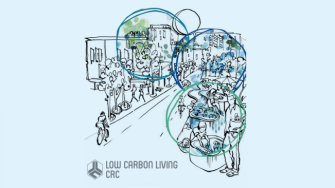Program 3: Engaged Communities

This project will analyse current policies and incentives for low carbon living education in Australia. It will draw from international best practice experience, implementation and incentives to help solve the policy gaps and problems that exist in the provision of education and training in the construction industry, undermining the transition to a low carbon living future.
The project outcomes will include a suite of incentives and capacity building educational policy frameworks with proposed timeliness and implementation strategies.
Dr Vanessa Rauland
Complete
08/2014 to 06/2015
- Publications
- Posters
- News
- Partners
CRCLC Project Reports
RP3022: Participants Forum 2014 Handbook: Round Table - Industry & Government Driving National Capacity Building
Handbook: Round Table - Industry & Government Driving National Capacity Building
The discussion handbook will be used to help participants gain an understanding of the project and begin a dialogue with participants leading up to the CRCLCL Participant Forum in November 2014.
Aim of the session: To engage industry practitioners, government policy makers, education providers and researchers in a co-creation session to initiate the development of an advice framework and long-term implementation guide.
Background: In 2013, ASBEC released the Sustainability Skills Collaboration Framework. The round table looks to explore a set of impediments, incentives and international examples aimed at developing a long-term implementation framework to increase policy and program consistency, participation, and recognition of sustainability programs across the whole building process in Australia.
Authors: Dr Alexis Esposto and Tomi Winfree, Swinburne University of Technology
Handbook: Round Table - Industry & Government Driving National Capacity Building (868222 PDF)
RP3022: Report: Policy impediments and incentives for effective education and training - Final Report
This report presents the research findings and advice framework from the Cooperative Research Centre for Low Carbon Living (CRC LCL) Research Project RP3022: Policy impediments and incentives to effective education and training.
The aim of this report is to create awareness about the incentives and impediments to Australian education policies aligned to sustainability, energy efficiency and low carbon living in continuing education and training targeted at trades and professionals practicing in the built environment. As most often referred to, engagement in continuing professional development (CPD) is typically beyond a primary qualification such as a Certificate III or a bachelors degree in the built environment. The CPD policies investigated as part of this research offer insights from the perspective of government, industry and vocational education policies and associated programs.
The full report is attached below.
RP3022 Final Report (1112993 PDF)
CRCLCL Project Posters
Research Snapshot Poster - RP3022
Research Snapshot A3 size poster from Participants Annual Forum 2014
Research Snapshot Poster - RP3022 (235430 PDF)
News article
Media Release: National energy-efficiency education, increased incentives and new government policy recommended for building industry – new research
10 October 2016
New research by the CRC for Low Carbon Living recommends four key actions to help Australia meet carbon reduction targets:
- Create a national education platform for the built environment.
- Align research, training, and policy.
- Improve training incentives across the industry.
- Prepare a future-ready building workforce.
The study found more barriers than incentives in current sustainability and energy-efficiency training. Key issues include lack of government leadership, poor coordination, and minimal CPD (continuing professional development) requirements.
Professor Peter Graham (Swinburne University) emphasized the need for a national CPD framework, while researcher Tomi Winfree called for integrated, role-specific training across the supply chain. Dr. Alexis Esposto highlighted the importance of aligning workforce skills with industry needs.
The report urges collaboration between government, industry, and educators to develop engaging, accessible training and a consistent national policy to support a low-carbon future.